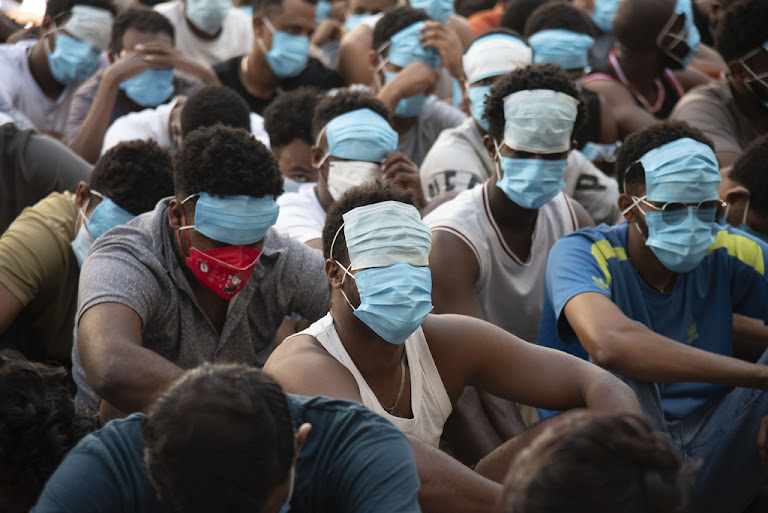Myanmar Victims Freed From Scams, Now Held in Detention Limbo
Thousands freed from Myanmar’s cyber scams now face indefinite detention, lacking food, medical care, and a clear path home.

Thousands of people rescued from forced labor in Myanmar’s notorious cyber scam centers now face a new ordeal: indefinite detention in overcrowded, unsanitary facilities. Last month’s highly publicized operation by Thai, Chinese, and Myanmar authorities, which liberated over 7,000 individuals from locked compounds, offered a glimmer of hope. However, this initial victory against sprawling criminal networks has morphed into a burgeoning humanitarian crisis, leaving survivors languishing with limited food, inadequate medical care, and no clear path home.
These individuals, from countries worldwide, were lured to Thailand with promises of well-paying office jobs. Instead, they were ensnared in a modern form of slavery, forced to work up to 16 hours a day perpetrating online scams, primarily targeting Americans. Refusal to comply resulted in brutal punishments, including beatings, starvation, and electric shocks. “Your passport is confiscated, you cannot go outside, and everything is like hell, a living hell,” recounted a Pakistani survivor to the Associated Press, speaking on condition of anonymity for fear of reprisals.
These cyber scams, operating from fortified compounds, surged during the pandemic, preying on vulnerable individuals globally. The UN estimates losses in Asia alone reached a staggering $18 to $37 billion in 2023, highlighting the scale of this criminal enterprise and the limited government response. The crackdown gained momentum after a high-profile case involving a young Chinese actor trafficked to Myanmar, sparking a viral social media campaign by his girlfriend that led to his release. Subsequent pressure from Beijing prompted Thailand to cut essential utilities to border towns in Myanmar, pushing the ruling ethnic militias—the Kayin Border Guard Force (BGF) and the Democratic Kayin Buddhist Army (DKBA)—to facilitate the release of thousands.
Ironically, freedom proved elusive for many rescued. Now held in BGF-controlled army camps or repurposed scam compounds, they endure squalid conditions, sleeping on floors and relying on meager rations provided by their captors. Exclusive photos obtained by the AP depict a scene of quiet desperation: detainees, faces obscured by surgical masks, huddle together under the watchful gaze of armed guards. “It felt like a blessing that we came out of that trap, but the actual thing is that every person just wants to go back home,” confided a 24-year-old Indian man, also speaking anonymously from a makeshift detention center.
Repatriation has been agonizingly slow. Thai authorities insist on immediate repatriation upon border crossing, leaving many stranded while awaiting assistance from their embassies. China has organized chartered flights, but most other countries have lagged. Over a hundred Ethiopians remain stuck, lacking the $600 needed for a plane ticket. Although Thai officials have pledged to expedite the process, allowing embassy staff to enter Myanmar and promising to process up to 300 individuals per day, the bottleneck persists.
Small non-profit organizations, operating with limited resources, struggle to provide essential aid. Amy Miller, Southeast Asia director of Acts of Mercy International, described the situation as overwhelming: “When we’re looking at numbers in the thousands, the ability to get them over to Thailand and process them and house them and feed them would be impossible for most governments.” She highlighted the need for a coordinated global response. The recent halt to U. S. foreign aid funding further exacerbates the crisis, crippling support for organizations like the UN’s International Organization for Migration, which previously provided care for trafficking victims.
Beyond the immediate humanitarian crisis lies the larger issue of dismantling the criminal networks. Experts point out that the militias involved in the releases, particularly the BGF, have been implicated in profiting from the scam operations. While the crackdown generated pressure, these criminal groups, with vast resources and adaptable business models, are likely to find ways to circumvent disruptions. The lack of major prosecutions or permanent compound shutdowns underscores the operation’s limited impact so far. “This doesn’t affect anything,” lamented a Pakistani detainee, highlighting the wealth and resilience of the criminal masterminds. As thousands languish in detention limbo, the question remains: will the international community muster the concerted effort needed to truly dismantle these criminal networks and bring the perpetrators to justice?









